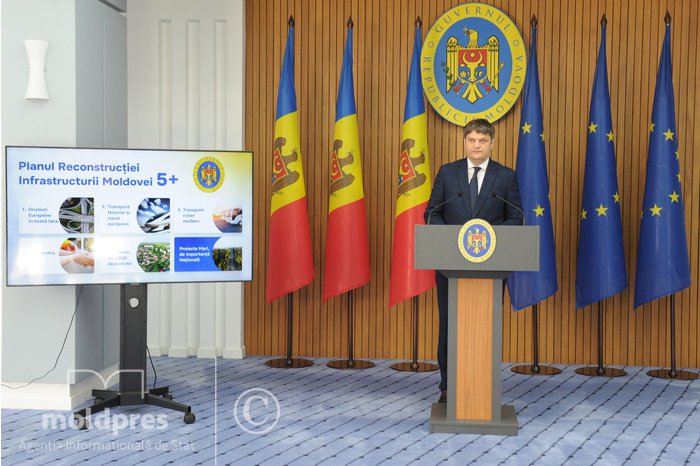Minister of Infrastructure and Regional Development unveils Moldova's infrastructure reconstruction plan for next years
14:01 | 14.09.2023 Category: Economic
Chisinau, 14 Sep. /MOLDPRES/- Minister of Infrastructure and Regional Development Andrei Spînu presented today Moldova's infrastructure reconstruction plan for the next years.
The document includes six strategic priorities, including one of which targets large-scale infrastructure projects. "In the last two years we have started an extensive reconstruction process. I know we need to do more. In the next two years, we must build and realize projects that will fundamentally change the way our country looks. The infrastructure reconstruction plan includes 5+1 strategic priorities, which will create European living conditions for every citizen", Spînu said.
The first priority concerns the construction of European roads.
According to him, in the next period more roads and bridges will be built: Soroca - Arionești - Otaci section, Troița Nouă bypass road, Hâncești - Lăpușna road, Cimișlia city belt, Vulcanesti city belt, sectors 2 and 3 of the Chisinau city belt, Balti - Criva road, Chisinau - Leușeni road, Hâncești - Leova - Cantemir - Cahul - Giurgiulești road, the bridges over the Prut - Cahul - Oancea, Leușeni - Albita, Sculeni - Sculeni. The minister added that this year around 500 million lei were allocated for the modernization of regional roads.
The second priority concerns rail and sea transport. "We need to increase the speed with which the trains run and develop the Giurgiulesti port. Last year, freight transport increased by around 30 percent, both on the rail and sea sectors. Due to the poor condition of the railways, at the moment the average speed of the railway in Moldova is less than 40 km per hour. The European standard is a minimum of 100 km for the transport of goods and 150 km per hour for the transport of passengers", said Spînu.
Another priority aims to connect all localities in the country to public water distribution networks. He noted that in 2022, public water networks have expanded by about 16 percent and 245 km of aqueducts have been put into operation in villages and cities in the country. "By 2030, we aim to connect all localities to the public water and sewerage network," he pointed out.
The fifth priority is the European Village Program and the construction of well-maintained localities. He said that so far, more than 180 projects within the Program have already been completed. The official also referred to another priority, which aims at large projects of national importance, far-reaching projects.
He said "the resources from the country's budget are not sufficient to carry out such projects and for this reason the authorities insist on saying that the only correct way to develop the country is European integration, that only being close to the European family can bring us these resources necessary for the development of the country".

